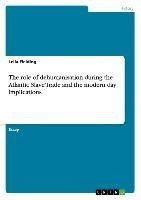
-
 Anglický jazyk
Anglický jazyk
The role of dehumanisation during the Atlantic Slave Trade and the modern day implications
Autor: Leila Fielding
Essay from the year 2012 in the subject History - Africa, grade: 1:1 (First Class), , language: English, abstract: In order to comprehend acts of oppression such as the slave trade, not to mention the atrocities which accompanied it, an investigation into... Viac o knihe
Na objednávku, dodanie 2-4 týždne
14.76 €
bežná cena: 16.40 €
O knihe
Essay from the year 2012 in the subject History - Africa, grade: 1:1 (First Class), , language: English, abstract: In order to comprehend acts of oppression such as the slave trade, not to mention the atrocities which accompanied it, an investigation into the psychological reasoning of the oppressors must be considered. People are not inherently evil; however, all human beings have the capacity to commit evil acts. Dehumanisation is commonplace in instances of persecution. John Wade describes dehumanisation as a "psychological state and linguistic transition which occurs during conflict which both justifies past behaviour; and encourages future aggressive conflict." In another definition; to dehumanise is to deprive a person or group of human qualities, stripping them of their personal identity and individuality. In instances of persecution, dehumanisation serves as a justification and rationalisation of past and future behaviour. With these definitions in mind, slavery is the epitome of dehumanisation. Many take for granted the dehumanisation of slaves. However, the power of this psychological spur must be considered in depth, chiefly because dehumanisation is still taking place and leading to disastrous consequences such as genocide and mass murder in the twenty-first century.
- Vydavateľstvo: GRIN Verlag
- Rok vydania: 2012
- Formát: Paperback
- Rozmer: 210 x 148 mm
- Jazyk: Anglický jazyk
- ISBN: 9783656294009






 Ruský jazyk
Ruský jazyk 





